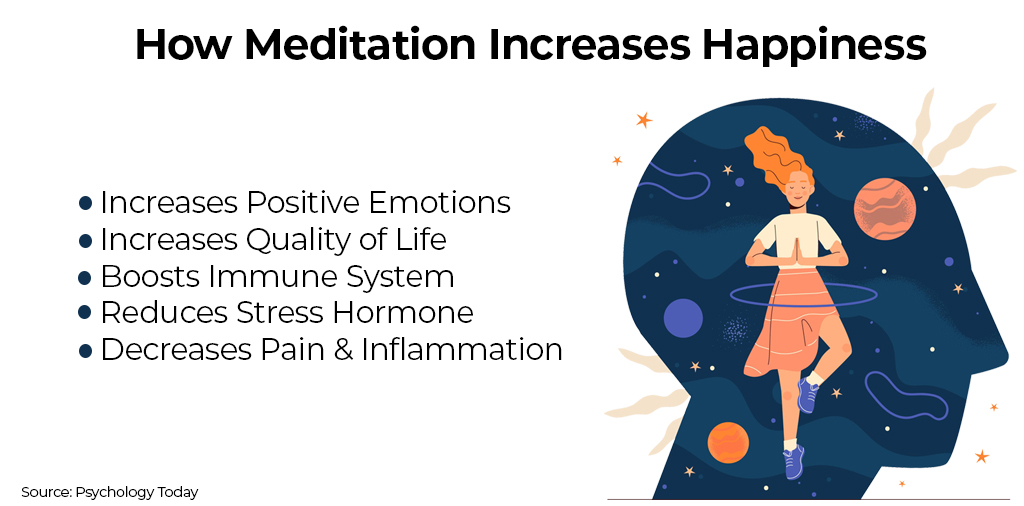In a world of technological advancements, being able to stay attentive on a task is a blessing. Attention is the gateway to all thoughts and emotions. High or low attention spans have been affecting individuals’ perception, problem-solving, and decision-making abilities. A good attention span affects the brain positively while a low attention span affects brain functions negatively. In other words, if a person can't stay attentive, they can't think effectively.
Did you know that the attention span of a human being is 8 seconds which was 11 seconds in the year 2000? That is lesser than an attention span of a goldfish!
But there is good news for those who regularly meditate through mindfulness meditation.
Mindfulness meditation is providing individuals benefits on their physical and mental health. Mindfulness meditation benefits physiological health by enhancing mood, lowering stress, and fostering a happy mindset. It has also improved attention.
Benefits of Increased Attention
As numerous studies in the field of neuroscience have demonstrated, mindfulness meditation is one of the most effective ways to improve attention and has the ability to boost intelligence on all levels. Guided meditation has the effect of establishing the most advantageous brainwave frequencies. As a result, creativity, idea production, and cognitive functioning all improve dramatically. A person’s general intellectual ability also increases with increased attention.

The Effects of Meditation on Attention
While a person may wonder how mindfulness meditation may increase the attention span of an individual, it’s no rocket science!
Studies around the world have proven the theories that mindfulness meditation increases the attention span in individuals.
Increased IQ and Emotional Intelligence Enhances Attention
Mindfulness meditation improves a person’s attention span by increasing their IQ and also improving their emotional intelligence (EQ). The majority of people use only half of their brains, creating an imbalance. That is where mindfulness meditation is quite beneficial. Meditation synchronizes both the left and the right brain functions and increases its processing power. When the left (logical) and right (creative) sides of the brain function in unison, attention span increases.
Additionally, the level of creativity increases, while the ability to think deeply and pay attention improves. This coordinated brain function is a characteristic frequently observed in highly successful people. It can be developed by anyone through regular mindfulness meditation practices.
Increased Brain Foldings Enhance Attention Span
Researchers have demonstrated that meditation increases the size of the brain using a scientific technique called neuroplasticity, which helps to improve attention.
In its simplest terms, meditation enhances the brain's efficiency and attention span, resulting in an improvement in intellect. According to traditional beliefs, intelligence was a predetermined trait that was carried by DNA and remained constant throughout life. However, brain scans of those who meditate regularly have demonstrated that individuals can enhance their brain's performance and attention span through mindfulness meditation.
When meditation becomes a part of a person’s daily routine, it has the potential to alter their lives in a variety of ways, including an increase in IQ. Attention is a critical component of IQ and intelligence. Whether an individual is studying for exams or picking up a new skill, attention is important in all aspects of decision-making. As a result of frequent meditation, the parts of the brain linked with memory, such as the hippocampus and the frontal brain lobe, grow in size, which increases the attention span.
Meditation improves brain capacity and simplifies daily chores by targeting critical parts of the brain as well as short- and long-term memory. Additionally, meditation has a beneficial impact on one's inner intellect, which is developed through listening to one's inner voice.
Inner Intelligence Sparks Attention Span
Individuals are obligated to develop their inner intelligence, also known as insight and intuition, through frequent meditation. Not surprisingly, numerous academic studies demonstrate that success is mostly determined by inner intellect. Notable success stories and highly successful businessmen have exhibited the ability to generate ideas through intuition or gut feelings rather than through other forms of feelings.
According to scientists, meditation has an effect on both of these underlying qualities of inner intelligence. For example, sparking insight, spontaneously comprehending things without being instructed, being creative, staying focused, and transcending the five common senses to the sixth is all that mindfulness meditation improves.
Because the objective of meditation is to focus attention on breathing, it truly empowers an individual to focus on the vital areas of their life.
The straightforward yet powerful mindfulness meditation exercise enables a person to detach their thoughts from various distracting factors that contribute to tension and worry. All of these factors increase a person’s attention span which provides immense long-term benefits.
Increased Concentration Empowers Attention Span
The majority of people spend their entire lives unable to make rational decisions based on their emotions or to deal with them in a reasonable manner. These individuals are essentially imprisoned by their responses to external stimuli. Although external events and behaviors are beyond a person’s control, meditation enables them to respond positively to them. The increased desire to change oneself for the better also enhances the ability to stay focused for long periods of time.
By concentrating on their breathing during meditation, individuals acquire the ability to concentrate on other aspects when vulnerable thoughts disturb them, such as images or perhaps happy moments. Additionally, when the brain is in the delta or theta phase (sometimes referred to as sluggish brain signals), neuroplasticity rises. Through mindfulness meditation, individuals give optimal relaxation to their brains when they focus their attention on their breath. Surprisingly, the brain improves its functions; thus, meditation improves attention.
Conclusion
To summarize, developing a regular meditation practice has been shown to greatly alter the way your brain processes and, as a result, makes you more attentive. By focusing on the critical areas of the brain and achieving a healthy balance between the brain connection, individuals can make better decisions and respond more positively to challenging circumstances. When a person meditates, they experience a sense of serenity and peace in their life.



